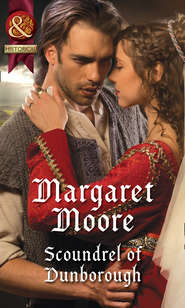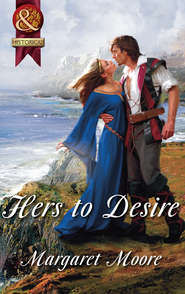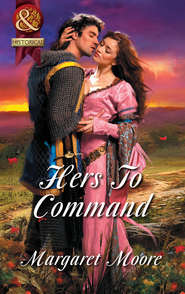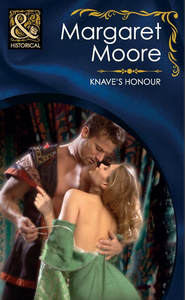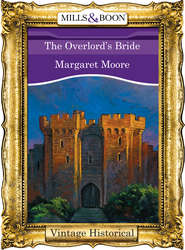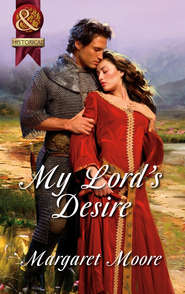По всем вопросам обращайтесь на: info@litportal.ru
(©) 2003-2025.
✖
The Notorious Knight
Настройки чтения
Размер шрифта
Высота строк
Поля
A collective sigh filled the hall. Apparently the men of Averette didn’t share his reservations about having a woman in command of a castle.
Perhaps it was different here because of what Armand had told him about the late lord of Averette. Lady Gillian’s father had been vicious, cruel and unjust. Under those circumstances, perhaps any new lord would be met with dread and suspicion. Nevertheless, and despite the evidence of his own eyes—for seeing Armand and Adelaide together, no one could doubt but that they were deeply in love—Bayard still couldn’t accept that Armand was willing to leave this castle and estate in a woman’s control. To be sure, Lady Gillian was not the most feminine female he’d ever encountered, but she was still a woman.
“Now, my lord,” she said, returning to her seat and turning the full force of her vibrant green eyes onto him, “tell me about this trial.”
Since Bayard had no choice but to answer, he did, repeating the bare facts. “My half brother was falsely accused of treason and proved his innocence in a trial by combat against one of the men who denounced him to the king.”
“I’ll say he proved it!” Frederic cried, fairly bouncing in his chair. “He ran his sword right through Sir Francis’s face!”
The lady gasped, the priest paled, and the steward looked rather queasy.
“That was the traitor’s choice,” Bayard explained, not wanting them to think Armand was some kind of savage. “Francis ran into Armand’s sword rather than suffer a slow execution.”
“I wish I’d seen it!” Frederic exclaimed.
“A true knight takes no pleasure in death, however it comes about,” Bayard said swiftly, and sincerely. “When he has a duty to do, he does it, but he should never relish the taking of a life.”
He turned back to Lady Gillian, whose face bore an expression he couldn’t quite decipher. But he didn’t care what she thought. He’d had enough of her unladylike demeanor and behavior, her envious steward, her orders and refusals.
“If you’ll excuse me, my lady,” he said, getting to his feet, “it’s been a long day, so I’ll give you good night.”
No doubt just as happy to see the last of him for the day, she regally inclined her head. “Good night, Sir Bayard.”
“May I stay?” Frederic asked.
Since he didn’t require his squire’s help to prepare for bed, Bayard nodded. Then he bid his men a restful night and marched from the hall.
WHILE SUPPOSEDLY LISTENING to Dunstan relate the cases expected to come before for judgment at the hall moot, Gillian watched Sir Bayard cross the hall with long, purposeful strides. He paused to have a word or exchange greetings with his men, and they replied with seemingly genuine good humor, as if he were their friend as well as commander.
Interesting, and quite different from Iain’s method of command. He would no sooner jest with his men than he’d strip naked in the courtyard.
Sir Bayard would likely be only too willing to do such a thing if he lost a wager or for some other silly reason. With such a body he’d probably be glad to.
She could just imagine him standing there, smiling with arrogant vanity, taking off his clothing one piece at a time…
“My lady?” Dunstan said, laying his hand on her arm. “Did you hear me?”
As embarrassed as if Dunstan had read her thoughts, she swiftly pulled away. “Yes. If the chandler’s daughter wishes to marry the cooper’s son, I have no objections.”
Unable to prevent a blush, she took a drink of wine while Dunstan slowly and deliberately folded his hands upon his lap.
Chapter Four
THE NEXT DAY, GILLIAN ROSE from her seat at the table in the solar where she’d been reviewing the tithe rolls and lists of foodstuffs she’d recently purchased. She had to be aware of estate income and expenses, but sitting and staring at rows of figures was not how she preferred to spend her time.
Walking to the window, she looked out over the land she loved—the fields, meadows and woods, the village, and especially the people she cared about as if they were her family. She could see the mill and its wheel slowly turning, suggesting a peace she knew was absent from the miller’s household. Boats plied the river, and on the banks, several women did their washing, spreading their linen on bushes to dry and bleach in the sun. A few children swam a short distance away, splashing each other, their shouts and laughter inaudible above the bustle of the servants, and wagons, and merchants delivering goods in the yard below.
Smoke rose from the smithy in gray wisps and she could easily imagine Old Davy holding court with his fellows, talking about the news of the day, speculating about what the king might do next to try to retrieve his lands in France, and what he might tax to raise the money to do it.
She could see the open space of the green, and the wagons of some peddlers drawn up there, no doubt to the chagrin of those merchants whose stalls bordered the green. In the yard belonging to the widowed alewife, the cooper was unloading barrels. She was likely complaining, albeit in a good-natured way, about the price he’d charged her to make them. When he was finished, they’d probably retire to her brewery and sample her latest, then finish the day in bed together, for it was no secret that their relationship went beyond the bounds of business.
If she were to marry, Gillian reflected, she’d have to leave her home, and her friends, and the people she cherished to go to her husband’s estate. She would be a stranger among strangers, and surely very lonely.
Even when James was alive and they’d talked of a life together, she’d been troubled by that possibility.
To think it had been less than a year since her father’s death and she’d become the chatelaine of Averette, with Adelaide’s blessing and promise that it would always be so. Less than a year since Adelaide had gone to court. Less than a year since Lizette had gone north to visit friends and make more, for as Gillian never wanted to leave Averette, Lizette hated the notion of being tied to one place.
Would a man like Sir Bayard ever understand how she felt about her home and her desire to ensure that everyone here was safe and secure, at least as much as she could? That she would forego the things women were supposed to crave—a husband and even the joy of children—to make it so? And that she didn’t want to be under the power of any man?
Probably not. Indeed, she could easily imagine his disbelief and scorn if he ever learned of her vow never to marry, and that she had taken it willingly—nay, eagerly, since James had died.
“My lady?”
She turned to find Dunstan, dressed as usual in a long, dark tunic, standing on the threshold with a parchment in his hand. He wasn’t alone, however. There was a man standing beside him whom she’d never seen before. He was about the same age as Dunstan, and well dressed. He was well groomed, too, except for his rather unkempt beard.
“My lady, this is Charles de Fenelon,” Dunstan said as he stepped into the room. “He’s a wine merchant from London, with most excellent wares.”
Judging by his clothes, the merchant’s business must be a prosperous one. She guessed from the slight scent of wine about Dunstan that he’d recently tasted samples of some of the aforementioned wares.
“It’s a pleasure to meet you, my lady,” de Fenelon said with a bow and an ingratiating smile. “I’ve heard nothing but praise of you in the town.”
Dunstan, who knew how she felt about flattery, held out a small scroll. “Here’s a list of his prices.”
As she took it, their hands touched for a moment. Trying to ignore the unwelcome sensation, she moved toward the window.
“Our stores are rather low,” Dunstan noted. “Of course, we wouldn’t need so much wine if our guests would take their leave.”
Gillian wasn’t pleased that Dunstan had said such a thing in front of the merchant, but she wasn’t going to chastise her steward, not when she knew that more than concern for the wine stores had prompted his remark. He was jealous of Sir Bayard, although he had no reason to be. She didn’t care about Sir Bayard that way.
But neither did she harbor any desire for Dunstan.
She’d always thought of him as a brother, for his gentle, kindly father had been the steward here before him. Recently, however, and much to her dismay, she’d realized Dunstan’s feelings for her had changed into something more than brotherly affection. Unfortunately, while she could be blunt and direct about many things, she couldn’t bring herself to speak to Dunstan about his feelings for her, or tell him that she did not, and never would, reciprocate them.
Instead, she hoped the difference in their rank would prevent him from speaking to her of love. She was, after all, a lord’s daughter and he the untitled son of a Norman knight’s bastard. Although that difference didn’t influence either her affection or her trust in him, many would tell him to look for love elsewhere because of that alone. There were plenty of young women of lesser rank in and around Averette who would gladly consider marriage to the kind-hearted, competent steward.
But not her.
Focusing on the list, she read it quickly and said to de Fenelon, “Your prices seem a bit high.”
His face fell. “That is the best I can do, if I’m to make any profit at all.”
He probably thought that because she was a woman, he could play on her sympathy and thus charge her more. “We shall either take them at the prices you have written here, or not at all.”
“Very well, my lady,” he agreed, thankfully without trying to haggle.
Because his prices were satisfactory, she said, “If your wine is as good as Dunstan claims, we’ll be happy to do business with you again.”
“Thank you, my lady,” Charles replied, beaming with delight.






